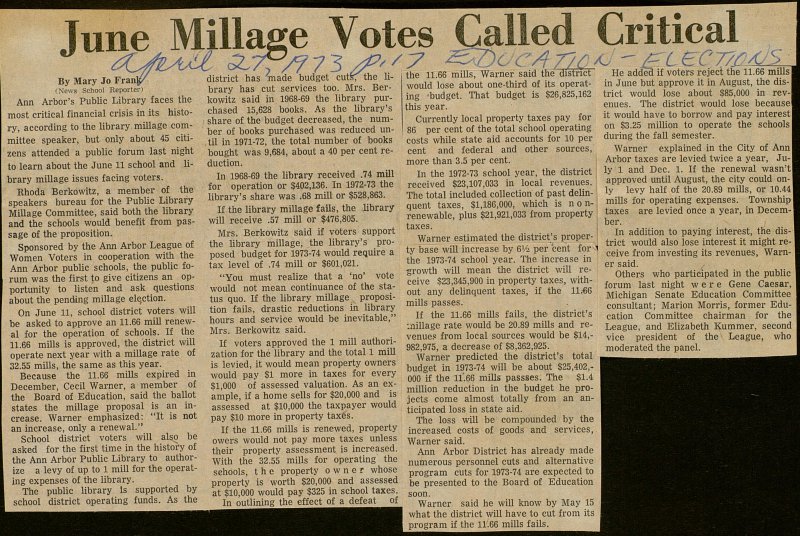June Millage Votes Called Critical

Arm Arbor's Public Library faces the most critical financial crisis in its history, according to the library millage committee speaker, but only about 45 citizens attended a public forum last night to learn about the June 11 school and library millage issues facing voters. Rhoda Berkowitz, a member of the speakers bureau for the Public Library Millage Committee, said both the library and the schools would benefit from passage of the proposition. Sponsored by the Ann Arbor League of Women Voters in cooperation with the Ann Arbor public schools, the public forum was the first to give citizens an opportunity to listen and ask questions about the pending millage ele,ction. On June 11, school district voters will be asked to approve an 11.66 mili renewal for the operation of schools. If the 11.66 milis is approved, the district will opérate next year with a millage rate of 32.55 milis, the same as this year. Because the 11.66 milis expired in December, Cecil Warner, a member of the Board of Education, said the ballot states the millage proposal is an increase. Warner emphasized: "It is not an increase, only a renewal." School district voters will also be asked for the first time in the history of the Ann Arbor Public Library to authorize a levy of up to 1 mili for the operating expenses of the library. The public library Is supported by school district operating funds. As the district has 'made budget cutsf the library has cut services too. Mrs. Berkowitz said in 1968-69 the library purchased 15,628 books. As the library 's share of the budget decreased, the number of books purchased was reduced until in 1971-72, the total number of books bought was 9,684, about a 40 per cent reduction. In 1968-69 the library received .74 mili for operation or $402,136. In 1972-73 the library's share was .68 mili or $528,863. If the library millage fails, the library will receive .57 mili or $476,805. Mrs. Berkowitz said if voters support the library millage, the library's proposed budget for 1973-74 would require a tax level of .74 mili or $601,021. "You must realize that a 'no' vote would not mean continuance of the status quo. If the library millage proposition fails, drastic reductions in library hours and service would be inevitable," Mrs. Berkowitz said. If voters approved the 1 mili authorization for thé library and the total 1 mili is levied, it would mean property owners would pay $1 more in taxes for every $1,000 of assessed valuation. As an example, if a home sells for $20,000 and is assessed at $10,000 the taxpayer would pay $10 more in property taxês. If the 11.66 milis is renewed, property owers would not pay more taxes unless their property assessment is increased. With the 32.55 milis for operating the schools, the property o w n e r whose property is worth $20,000 and assessed at $10,000 would pay $325 in school taxes. In outlining the effect of a defeat of the 11.66 milis, Warner said the district would lose about one-third of its operating 'budget. That budget is $26,825,162 this year. Currently local property taxes pay for 86 per cent of the total school operating costs while state aid accounts for 10 per cent and federal and other sources, more than 3.5 per cent. In the 1972-73 school year, the district received $23,107,033 in local revenues. The total included collection of past delinquent taxes, $1,186,000, which is n o nrenewable, plus $21,921,033 from property taxes. Warner estimated the district's property base will increase by 6V2 per 'cent for 1 the 1973-74 school year. The increase in growth will mean the district will receive $23,345,900 in property taxes, without any delinquent taxes, if the 11 .E6 milis passes. If the 11.66 milis fails, the district's millage rate would be 20.89 milis and revenues from local sources would be $14,982,975, a decrease of $8,362,925. Warner predicted the district's total budget in 1973-74 will be about $25,402,000 if the 11.66 milis passses. The $1.4 million reduction in the budget he projects come almost totally from an anticipated loss in state aid. The loss will be compounded by the increased costs of goods and services, Warner said. Ann Arbor District has already made numerous personnel cuts and alternative program cuts for 1973-74 are expected to be presented to the Board of Education soon. Warner said he will know by May 15 what the district will have to cut from its program if the 11.66 milis fails. He added if voters reject the 11.66 milis I in June but approve it in August, the 1 trict would lose about $85,000 in rev-l enues. The district would lose becausel it would have to borrow and pay interest I on $3.25 million to opérate the schools I during the fall semester. Warner explained in the City of Annl Arbor taxes are levied twice a year, Ju-I ly 1 and Dec. 1. If the renewal wasn't approved until August, the city could only levy half of the 20.89 milis, or 10.44 milis for operating expenses. Township taxes are levied once a year, in December. In addition to paying interest, the district would also lose interest it might receive from investing its revenues, Warner said. Others who participated in the public forum last night w e r e Gene Caesar, Michigan Senate Education Committee consultant; Marión Morris, former Education Committee chairman for the League, and Elizabeth Kummer, second vice president of the League, who moderated the panel.